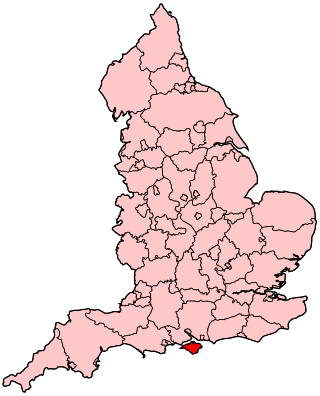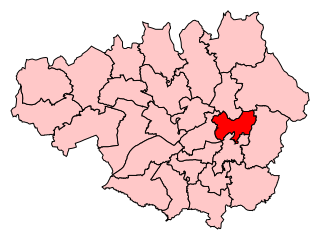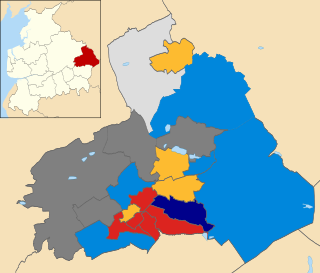
Orkney and Shetland is a constituency of the House of Commons of the Parliament of the United Kingdom. It elects one Member of Parliament (MP) by the first past the post system of election. In the Scottish Parliament, Orkney and Shetland are separate constituencies. The constituency was historically known as Orkney and Zetland.

Hereford was, until 2010, a constituency of the House of Commons of the Parliament of the United Kingdom. Since 1918, it had elected one Member of Parliament (MP) by the first-past-the-post voting system.

Isle of Wight is a constituency represented in the House of Commons of the UK Parliament since 2017 by Bob Seely, a Conservative.

Burnley is a constituency centred on the town of Burnley in Lancashire which has been represented since 2019 by Antony Higginbotham, a Conservative.

Ashton-under-Lyne is a constituency in the House of Commons of the UK Parliament. It has been represented since 2015 by Angela Rayner, who has served as Deputy Leader of the Labour Party since 2020.
Dundee was a constituency of the House of Commons of the Parliament of the United Kingdom from 1832 to 1950, when it was split into Dundee East and Dundee West.
Montrose Burghs was a district of burghs constituency represented in the House of Commons of the Parliament of the United Kingdom from 1832 until 1950.
Derby is a former United Kingdom Parliamentary constituency. It was a constituency of the House of Commons of the Parliament of England, then of the Parliament of Great Britain from 1707 to 1800 and of the Parliament of the United Kingdom from 1801 to 1950. It was represented by two members of parliament. It was divided into the single-member constituencies of Derby North and Derby South in 1950.
Shrewsbury was a parliamentary constituency in England, centred on the town of Shrewsbury in Shropshire.
Frome was a constituency centred on the town of Frome in Somerset. It returned one Member of Parliament (MP) to the House of Commons of the Parliament of the United Kingdom from 1832, until it was abolished for the 1950 general election. Between 1832 and 1885, it was a parliamentary borough; after 1885 it was a county constituency, a division of Somerset.
Flintshire was a parliamentary constituency in North-East Wales which generally returned one Member of Parliament (MP) to the House of Commons, latterly that of the Parliament of the United Kingdom, from 1542 until it was abolished for the 1950 general election.
Hythe was a constituency centred on the town of Hythe in Kent. It returned two Members of Parliament to the House of Commons until 1832, when its representation was reduced to one member. The constituency was abolished for the 1950 general election, and replaced with the new Folkestone and Hythe constituency.
Rochester was a parliamentary constituency in Kent. It returned two members of parliament (MPs) to the House of Commons of England from 1295 to 1707, then to the House of Commons of Great Britain from 1708 to 1800, and finally to the House of Commons of the Parliament of the United Kingdom from 1801 until the 1885 general election, when its representation was reduced to one seat.
Oldham was a parliamentary constituency centred on the town of Oldham, England. It returned two Members of Parliament (MPs) to the House of Commons of the Parliament of the United Kingdom. The constituency was created by the Great Reform Act of 1832 and was abolished for the 1950 general election when it was split into the Oldham East and Oldham West constituencies.
Manchester was a Parliamentary borough constituency in the county of Lancashire which was represented in the House of Commons of the Parliament of the United Kingdom. Its territory consisted of the city of Manchester.
Evesham was a parliamentary constituency in Worcestershire which was represented in the English and later British House of Commons. Originally a parliamentary borough consisting of the town of Evesham, it was first represented in 1295. After this its franchise lapsed for several centuries, but it then returned two Members of Parliament (MPs) from 1604 until 1868, when its representation was reduced to one member under the Representation of the People Act 1867.
Liskeard was a parliamentary borough in Cornwall, which elected two Members of Parliament (MPs) to the House of Commons from 1295 until 1832, and then one member from 1832 until 1885. The constituency was abolished by the Redistribution of Seats Act 1885.

The 2008 Pendle Borough Council election took place on 1 May 2008 to elect members of Pendle Borough Council in Lancashire, England. One third of the council was up for election and the Liberal Democrats lost overall control of the council to no overall control.
The 1875 Horsham by-election was fought on 17 December 1875. The by-election was fought due to the resignation of the incumbent Conservative MP, William Vesey-FitzGerald, who became Chief Charity Commissioner for England and Wales. It was won by the Liberal candidate Robert Henry Hurst (junior). who had previously been MP for the seat but was defeated at the previous General Election.
The 1874 City of Durham by-election was fought on 13 June 1874. The by-election was fought due to the voiding of the incumbent Liberal MP, Thomas Charles Thompson's election. It was retained by the Liberal candidate Farrer Herschell.






